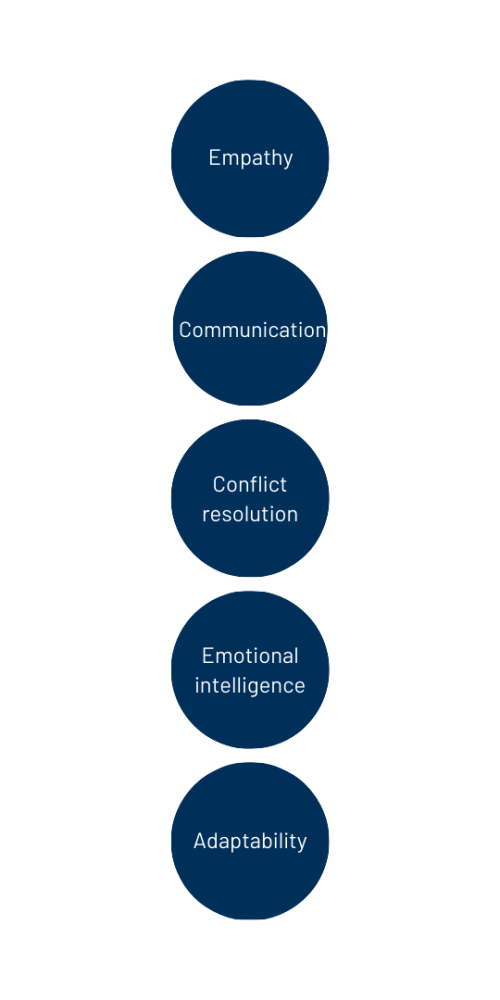

Richard Porstmann
The role of soft skills in interim management: how to conquer the world (and projects) with a smile
Reading time: 6 minutes
Table of contents
"The greatest successes in life are not achieved through individual skill alone, but through the ability to work with and inspire others."
In the world of interim management, where quick decisions and effective action are essential, it is easy to focus on hard skills such as expertise and experience. But in reality, it is often the soft factors that make the difference between success and failure. In this article, we examine the importance of soft skills in interim management and how they enable transformative leadership.
Interim management with .
Empathy as the foundation of leadership
Empathy is the ability to put yourself in the shoes of others and understand their perspective. Empathy is a key success factor in interim management, as it enables relationships to be built with employees, customers and other stakeholders and trust to be established. An interim manager with a high level of empathy can take into account the needs and concerns of all parties involved and thus develop more effective solutions.
Communication: The bridge between ideas and implementation
Clear and effective communication is essential for leading teams and successfully implementing projects. In interim management, interim managers must be able to communicate complex information in an understandable way and ensure that everyone involved is on the same page. It is also important to actively listen and accept feedback in order to create an open and supportive working environment.
Conflict resolution: Because we all want to be friends
Conflicts are unavoidable, especially in demanding projects or environments. An interim manager must be able to recognize, address and constructively resolve conflicts in order to maintain the team’s effectiveness. This requiresdiplomatic skills, empathy and the ability to find win-win solutions that takes into account the needs of all parties involved.

Emotional intelligence: the balance between data and humanity
Emotional intelligence is the ability to recognize, understand and regulate emotions, both in oneself and in others. In interim management, emotional intelligence can help to manage stress, build relationships and create a positive working environment. Interim managers with a high level of emotional intelligence are able to master difficult situations with confidence and inspire and motivate their teams.
Adaptability: flexibility in a changing landscape
The ability to adapt to new situations and remain flexible is crucial in interim management. Companies that hire an interim manager often do so in times of change or crisis, and it is important to react quickly to changing requirements and find creative solutions. Interim managers with high adaptability can quickly integrate into new teams and corporate cultures and thus ensure the success of the project.
Soft skills - the invisible pillars of interim management
These soft skills, often seen as a by-product of a manager, are actually the invisible pillars that support the success of a project. They not only create efficient working environments, but also promote an ethical and supportive working atmosphere.
Interim management is not only searching for technical experts, but also for management personalities with a holistic perspective. Soft skills are not bonuses, but the core competencies that make the difference between a successful and an exceptional interim manager.
By cultivating and developing these skills, interim managers can not only achieve short-term goals, but also promote long-term success and sustainable change in companies.
I will be happy to provide you with further information and a personal consultation. Discover the world of interim management and let’s shape the future together.
Conclusions
- Empathy as the foundation of leadership:
The ability to put yourself in someone else’s shoes not only enables you to build trust, but also to develop customized interim management solutions. - Communication as a bridge between ideas and implementation:
Clear and effective communication ensures that the entire team is on the same level of knowledge, promotes collaboration and creates a supportive working environment in interim management. - Adaptability in a changing landscape:
In times of change or crisis, the ability to adapt quickly is crucial in order to react flexibly to new challenges in interim management. - Conflict resolution for effective teamwork:
Diplomatic skills and the ability to find win-win solutions are key components for constructively resolving conflicts in interim management and maintaining the effectiveness of the team. - Emotional intelligence for balanced leadership:
A high level of emotional intelligence not only enables you to master difficult situations with confidence, but also creates an inspiring and motivating environment for interim management teams.
If you have any suggestions or thoughts on this topic, please write me.






